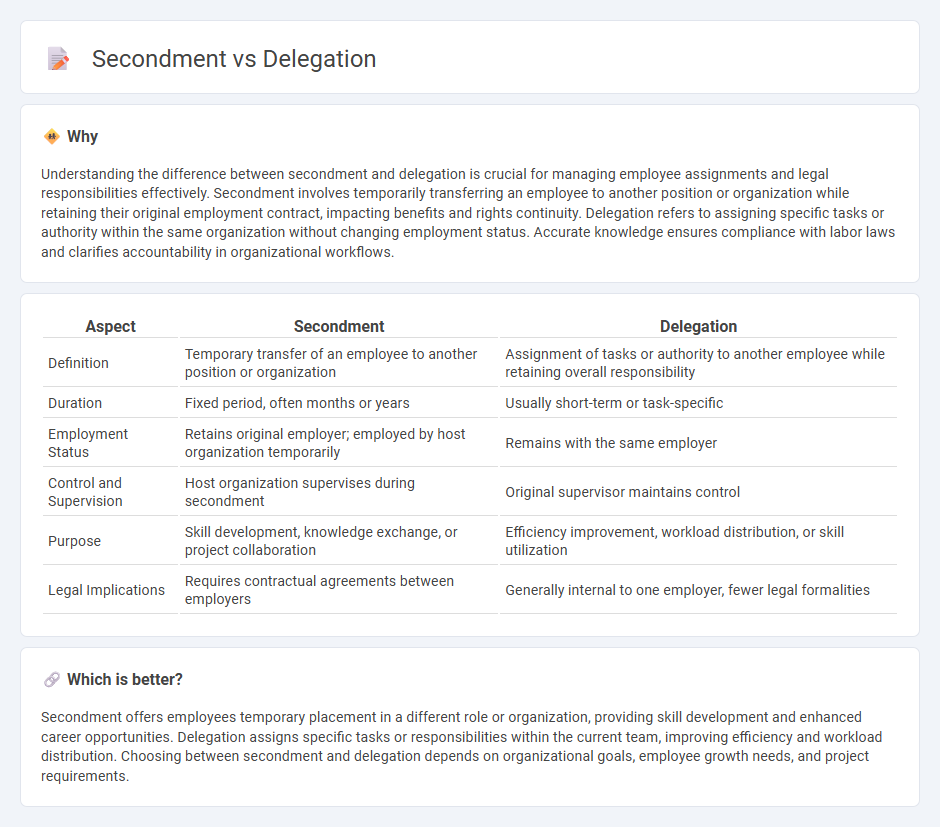
Secondment involves temporarily assigning an employee to another department or organization to gain experience or fulfill specific projects, often maintaining their original employment terms. Delegation refers to the process where a manager assigns tasks or responsibilities to a subordinate while retaining overall accountability for the outcomes. Explore the distinctions between secondment and delegation to optimize workforce management strategies.
Why it is important
Understanding the difference between secondment and delegation is crucial for managing employee assignments and legal responsibilities effectively. Secondment involves temporarily transferring an employee to another position or organization while retaining their original employment contract, impacting benefits and rights continuity. Delegation refers to assigning specific tasks or authority within the same organization without changing employment status. Accurate knowledge ensures compliance with labor laws and clarifies accountability in organizational workflows.
Comparison Table
| Aspect | Secondment | Delegation |
|---|---|---|
| Definition | Temporary transfer of an employee to another position or organization | Assignment of tasks or authority to another employee while retaining overall responsibility |
| Duration | Fixed period, often months or years | Usually short-term or task-specific |
| Employment Status | Retains original employer; employed by host organization temporarily | Remains with the same employer |
| Control and Supervision | Host organization supervises during secondment | Original supervisor maintains control |
| Purpose | Skill development, knowledge exchange, or project collaboration | Efficiency improvement, workload distribution, or skill utilization |
| Legal Implications | Requires contractual agreements between employers | Generally internal to one employer, fewer legal formalities |
Which is better?
Secondment offers employees temporary placement in a different role or organization, providing skill development and enhanced career opportunities. Delegation assigns specific tasks or responsibilities within the current team, improving efficiency and workload distribution. Choosing between secondment and delegation depends on organizational goals, employee growth needs, and project requirements.
Connection
Secondment and delegation both involve temporarily assigning employees to different roles or locations to enhance organizational flexibility and skill development. In secondment, employees are temporarily transferred to a different department or external organization, often for strategic projects, whereas delegation typically entails assigning specific tasks or responsibilities within the current team. This connection supports workforce optimization by fostering knowledge transfer, employee growth, and operational efficiency.
Key Terms
Authority
Delegation involves transferring specific tasks or responsibilities to a subordinate while the delegator retains overall authority and accountability. Secondment temporarily assigns an employee to another department or organization, often with shared or transferred authority for the duration of the assignment. Explore more about how authority dynamics differ between delegation and secondment to optimize workforce management.
Duration
Delegation typically involves short-term assignment of tasks or responsibilities, often lasting days to weeks, allowing employees to develop skills without long-term commitment. Secondment usually refers to a temporary transfer of an employee to another department or organization for several months to a year, facilitating deeper skill acquisition and organizational integration. Explore more to understand how duration impacts workforce management strategies.
Employer Responsibility
Delegation transfers specific tasks to another party while the employer retains full responsibility for employment conditions and legal obligations. Secondment temporarily assigns an employee to work under a different employer, shifting some responsibilities such as supervision and workplace safety to the host organization. Explore further to understand the detailed legal nuances and best practices in managing employer responsibilities in delegation and secondment.
Source and External Links
Delegation - Wikipedia - Delegation is the process of distributing and entrusting work to another person, where a manager assigns tasks and grants authority but retains ultimate responsibility, involving communication, allocation of duties, assignment of responsibility, and creation of accountability.
Delegation - NCSBN - Delegation in nursing includes a multifaceted process guided by national standards that clarify responsibilities among the employer, nurse leaders, delegating nurses, and delegatees, emphasizing legal awareness and communication within healthcare settings.
How to Delegate Effectively: 9 Tips for Managers - Delegation involves transferring responsibility for specific tasks, and effective delegation requires knowing what to delegate, matching tasks to employees' strengths and professional goals, and using delegation as an opportunity to build trust and develop team members.
 dowidth.com
dowidth.com